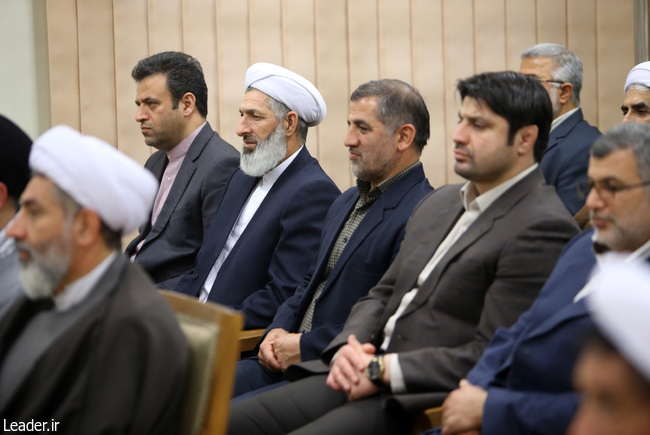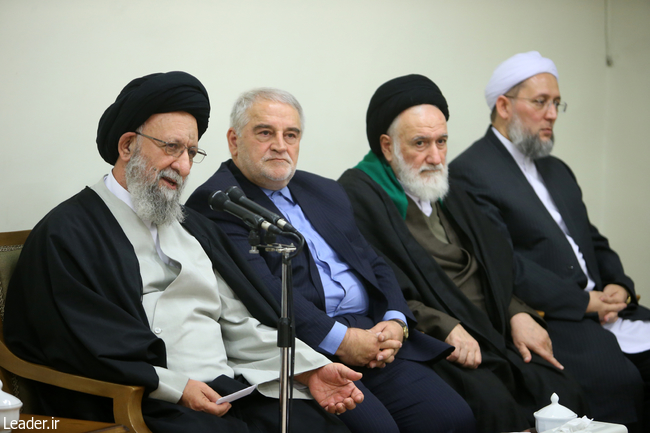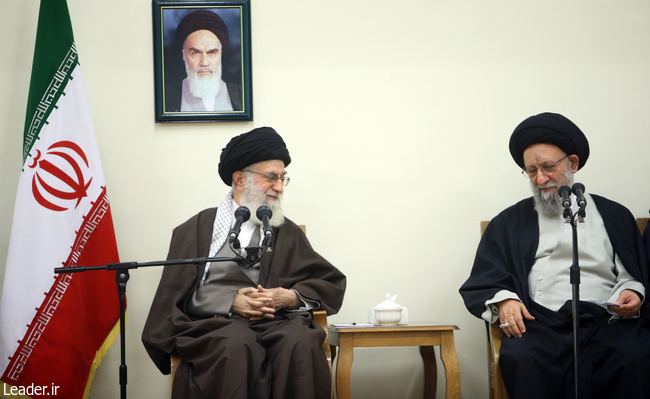Leader of the Islamic Revolution Ayatollah Seyyed Ali Khamenei met with members of the headquarters set up to commemorate 4,000 martyrs of Iran’s northern Golestan Province last Monday, the details of which were released on Thursday at the venue of the commemoration conference.
During the meeting, Ayatollah Khamenei described the sacrifice made by martyrs to “protect the Islamic Revolution [as well as] national dignity and future and history of the country” as very significant, adding, “If it were not for these sacrifices and love of martyrdom [among the Iranian people], the nascent sapling of the Islamic Revolution would not have endured in the face of hard tempests and would be annihilated. Therefore, this spirit of sacrifice and selflessness must be preserved and bolstered.”
The Leader of the Islamic Revolution described the “Islamic Iran” as the central point and main target of plots and attacks by the arrogance. Explaining the reason why enemies feel threatened by the Islamic Republic, Ayatollah Khamenei said, “At a time when all arrogance’s policies were aimed at isolating religion, the dear Islam and the Holy Quran started to govern this country and then entered different regions of the world. This astonishing and important development caused the enemy to feel threatened and [this is why] conspiracy and activity against the Islamic establishment started from the first day [after the victory] of the Islamic Revolution.”
Emphasizing the need to “recognize the enemy and its plots,” the leader mentioned a “general feeling of responsibility among officials and people,” as the main condition for the continuation of the enemies’ failure in the face of the Islamic establishment and pointed out, “All officials and people [of Iran] must feel responsible [in this regard] and set defending the Islamic establishment as their main duty.”
Ayatollah Khamenei said the revival [of the memory] and commemoration of martyrs was a “lasting good deed, continued charity, and a move to defend the Islamic establishment.” Giving recommendations to officials of the headquarters charged with the commemoration of martyrs, the Leader of the Islamic Revolution said, “Try to produce audiences, and that is, in fact, the same as finding audiences, in order to convey your intellectual and artistic products and productions to their minds.”
The Leader of the Islamic Revolution opined that conveying one’s message to minds and hearts of audiences was a complicated task needing artistic subtleties, and while emphasizing the need for the young people to know about their revolutionary history and identity, added, “The existing coordination, coexistence, and empathy between Shias and Sunnis in the country is the biggest weapon against the enemies of Islam and the Quran and Iran, and this important issue must be transferred to the minds of the young audiences in an artful manner.”
Ayatollah Khamenei also explained the positive points and characteristics of the people of Golestan Province, including “being endowed with superb manpower” and “optimal and effective coexistence among various ethnic and religious groups.” The Leader then pointed to plans made and heavy costs undertaken by enemies to sow discord among Iranians and added, “in the Islamic Iran and in various regions of Golestan Province, just to the contrary of plots and demands of Takfiri currents and enemy’s spy agencies, various ethnic groups and religions are doing their utmost to preserve [peaceful] coexistence and cooperation.”
The Leader of the Islamic Revolution described the existing cooperation and mutual compassion among various ethnic and religious groups as “purposive, targeted and decisive political work” against divisive efforts of enemies, and one of the real strengths of the country. The Leader added, “Such coordination and compassion and mutual communications are among the Islamic Republic’s unique potentialities and tools in the asymmetrical war with the global arrogance, namely, America and Zionism, and they are not able to understand and analyze this.”
The Leader mentioned “the pioneer nature of the people of Golestan [Province] in embracing the movement of [the late] Imam Khomeini,” “loyalty and sacrifice for the Islamic Revolution in such cases as the incident of November 26, 1978, and fighting against secessionist groups in early [years after victory of] the revolution,” and the “success of the IRGC [Islamic Revolution Guards Corps] and Army forces of the province in defending [the country] during the Sacred Defense [Iraqi imposed war against Iran]” as other prominent characteristics and positive points of this region, proving vigilance of its people. The Leader added, “I hail and express my compassion, trust and devotion for each and every one of people, officials as well as Shia and Sunni clerics of Golestan Province.”



